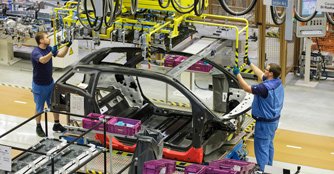BMW Group begins series production of the BMW i3 electric car in Germany
20 Sep 2013|2,261 views

This is the first time that Carbon Fibre Reinforced Plastic (CFRP) has been used in automotive volume production. The body structure of the BMW i3 consists entirely of this extremely lightweight and durable material, allowing the extra weight of the batteries for the electric drive system to be cancelled out.
Indeed, the entire value chain is firmly committed to sustainability and efficiency. Thanks to the elimination of the traditional painting process for steel and aluminium bodies, the plant uses 50 percent less energy and 70 percent less water. Electricity for the production of the i models is sourced from the wind turbines at the plant.
At its Leipzig plant alone, some €400 million (S$673 million) has been invested in new structures and machinery for the production of BMW i models which has aided the workforce, with the creation of 800 new jobs. The production network for BMW i also sees key components for the BMW i3 manufactured at BMW Group plants and joint venture facilities at Moses Lake in the U.S.A and Wackersdorf, Landshut and Dingolfing in Germany. In total, the company has invested around €600 million (S$1.01 billion) in the BMW i production network that has resulted in the creation of over 1,500 jobs.
The first BMW i3 to roll off the line will perform as the lead car for the International Berlin Marathon on the 29th September, and was handed over to German marathon runner Jan Fitschen. Deliveries of the BMW i3 to customers in Germany and other European countries will begin in November, with the car's launch in the U.S.A, China and other markets to follow in early 2014.
The BMW Group entered a new era in automotive construction with the start of series production of the BMW i3. Exceptionally high standards of sustainability and resource efficiency have been achieved in the selection of materials and production processes employed.
This is the first time that Carbon Fibre Reinforced Plastic (CFRP) has been used in automotive volume production. The body structure of the BMW i3 consists entirely of this extremely lightweight and durable material, allowing the extra weight of the batteries for the electric drive system to be cancelled out.
Indeed, the entire value chain is firmly committed to sustainability and efficiency. Thanks to the elimination of the traditional painting process for steel and aluminium bodies, the plant uses 50 percent less energy and 70 percent less water. Electricity for the production of the i models is sourced from the wind turbines at the plant.
At its Leipzig plant alone, some €400 million (S$673 million) has been invested in new structures and machinery for the production of BMW i models which has aided the workforce, with the creation of 800 new jobs. The production network for BMW i also sees key components for the BMW i3 manufactured at BMW Group plants and joint venture facilities at Moses Lake in the U.S.A and Wackersdorf, Landshut and Dingolfing in Germany. In total, the company has invested around €600 million (S$1.01 billion) in the BMW i production network that has resulted in the creation of over 1,500 jobs.
The first BMW i3 to roll off the line will perform as the lead car for the International Berlin Marathon on the 29th September, and was handed over to German marathon runner Jan Fitschen. Deliveries of the BMW i3 to customers in Germany and other European countries will begin in November, with the car's launch in the U.S.A, China and other markets to follow in early 2014.
This is the first time that Carbon Fibre Reinforced Plastic (CFRP) has been used in automotive volume production. The body structure of the BMW i3 consists entirely of this extremely lightweight and durable material, allowing the extra weight of the batteries for the electric drive system to be cancelled out.
Indeed, the entire value chain is firmly committed to sustainability and efficiency. Thanks to the elimination of the traditional painting process for steel and aluminium bodies, the plant uses 50 percent less energy and 70 percent less water. Electricity for the production of the i models is sourced from the wind turbines at the plant.
At its Leipzig plant alone, some €400 million (S$673 million) has been invested in new structures and machinery for the production of BMW i models which has aided the workforce, with the creation of 800 new jobs. The production network for BMW i also sees key components for the BMW i3 manufactured at BMW Group plants and joint venture facilities at Moses Lake in the U.S.A and Wackersdorf, Landshut and Dingolfing in Germany. In total, the company has invested around €600 million (S$1.01 billion) in the BMW i production network that has resulted in the creation of over 1,500 jobs.
The first BMW i3 to roll off the line will perform as the lead car for the International Berlin Marathon on the 29th September, and was handed over to German marathon runner Jan Fitschen. Deliveries of the BMW i3 to customers in Germany and other European countries will begin in November, with the car's launch in the U.S.A, China and other markets to follow in early 2014.
Latest COE Prices
October 2025 | 1st BIDDING
NEXT TENDER: 23 Oct 2025
CAT A$128,105
CAT B$141,000
CAT C$74,301
CAT E$140,009
View Full Results Thank You For Your Subscription.

























